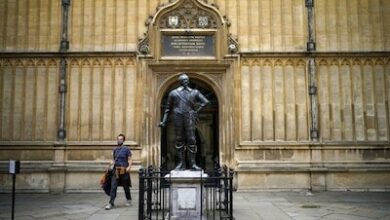Vladimir Putin spending big to shape Russia’s youth in his own image | World News
)
The government last month approved a youth policy through 2030 that targets the formation of “a patriotic, highly moral and responsible generation of Russian citizens (Photo: Reuters)
Nobody under 25 in Russia has known any other ruler than Vladimir Putin. The Kremlin is determined to ensure the new generation continues to be formed in the president’s image.
It’s committing hundreds of millions of dollars annually to promote Putin’s values and mold the minds of Russia’s young. Some of the changes are already visible. Children returning to schools on Monday at the start of the academic year in Russia were greeted by the national anthem and a ceremonial flag-raising, a ceremony the Education Ministry has been encouraging all schools to hold every week after the 2022 invasion of Ukraine.
The government last month approved a youth policy through 2030 that targets the formation of “a patriotic, highly moral and responsible generation of Russian citizens, capable of ensuring the sovereignty, competitiveness and further development” of the country, according to the strategy document.
Teenagers will have a new course this year in the “basic principles of security and defense of the Motherland,” replacing lessons that were more focused on safety and emergencies. They’ll be taught about weaponry, the basics of military preparedness, and life in the army, including in some cases by soldiers who’ve fought in Russia’s war in Ukraine.
The classes “will put a lot of things on a systematic basis” in schools, Putin said Monday during a televised discussion with a group of children in Kyzyl in Russia’s Tuva region, bordering Mongolia. Russians fighting in Ukraine were an “example of both patriotism and our centuries-old traditions with a special attitude to our Fatherland,” he said.
The Education Ministry is re-writing history books to drive home a message that the war Putin began isn’t only against Ukraine but also against a decadent West bent on destroying Russia and its traditional Orthodox way of life. Proposals drawn up by academic advisers to the government encourage history teachers to add figures involved in Russia’s full-scale invasion of Ukraine as the country’s modern heroes.
Another program urges teachers to promote the importance to students of having large families to reverse Russia’s deepening demographic crisis.
At some universities, students attend compulsory courses in the “fundamentals of Russian statehood” that were introduced by the Kremlin last year to promote patriotism and “ideological doctrines that have developed within Russian civilization,” according to the Education Ministry.
The Kremlin has a lot at stake: Russia last year had nearly 38 million people aged 14-35, about a quarter of the total population, according to Federal Statistics Service data.
“A new generation of Putinists is being formed, prolonging the existence of the regime itself,” said Andrei Kolesnikov, an independent researcher from Moscow, who previously worked at the Carnegie Endowment for International Peace. “They are preparing a generation in the spirit of totalitarian obedience.”
Russia is far from alone in seeking to foster a sense of national pride in its young. Children in many US schools start their day by reciting the pledge of allegiance, while most European countries have citizenship programs on the curriculum that aim to instill civic values and national identity.
The increasingly personalized nature of 71-year-old Putin’s rule during his quarter-century in power makes Russia’s effort distinctive, however. The former KGB agent has tightened his grip on the country by removing or jailing potential rivals and crushing pro-democracy protests. With his war in Ukraine grinding on at the cost of huge casualties, the Kremlin’s waging an ideological battle to rally Russians behind Putin and cast even mild critics as traitors. That’s as he extended his presidency for another six years at March elections, and can potentially rule to 2036.
This year alone the government allocated 45.8 billion rubles ($511 million) to youth patriotic education, slightly more than last year.
Some of Russia’s youth organizations are modeled on the Soviet-era Pioneer and Komsomol movements. They include the YouthArmy, a group supported by the Defense Ministry, whose more than 1 million members learn to march, receive firearms training and take part in official state events in military-style uniforms. It’s been sanctioned by the US and the European Union, which called the YouthArmy a “paramilitary organization” supporting Russia’s invasion of Ukraine.
State policy reaches out to the young in less formal ways as well. In March, Russia held The World Festival of Youth in the Black Sea resort of Sochi, drawing guests from more than 100 countries, including Iran, Mexico and Pakistan. Amid lectures and round tables often led by state officials and propagandists, participants were given the chance to meet Russian celebrities and Turkish soap opera star Burak Özçivit, who is popular in the country.
The government invested nearly 500 million rubles in a computer game based on Russian patriotic themes. Developed by Novosibirsk-based Cyberia Nova, the game launched in April and centers on the so-called Time of Troubles period of Russian history in the late 16th and early 17th centuries when the country was partially under occupation. The player controls a character named Yuri Miloslavsky, who joins a militia to liberate Moscow from Polish troops.
Some universities encourage students to show their support for the war against Ukraine through extracurricular activities, too. “We live in Russia and must live in the present,” said Sergei, a 20-year-old computer science student at one technical university outside Moscow, who’s part of a club that helps soldiers.
The state-funded youth camps and conferences promise participants career advancement, underlining a message that future success depends on unquestioning loyalty to the leader and the state.
To be sure, it’s far from clear how much official efforts to shape the outlook of young Russians will succeed. In Soviet times, many of those who joined the Komsomol only did so to gain access to privileges linked to membership of the group at universities, while paying lip-service to the Communist ideology.
In modern Russia, the situation is similar for families who don’t support Putin’s regime but have to live under laws that impose harsh punishment for dissent. “I can explain to my children at home what is good and what is evil,” said Alina, a mother of two students at school in the southern city of Voronezh.
“We have not yet reached totalitarianism,” said Alexandra Arkhipova, a Russian anthropologist based in France. “We have a Russian hybrid authoritarian system. It doesn’t yet need personal sincere involvement, it needs performances of obedience.”
First Published: Sep 03 2024 | 11:31 AM IST




